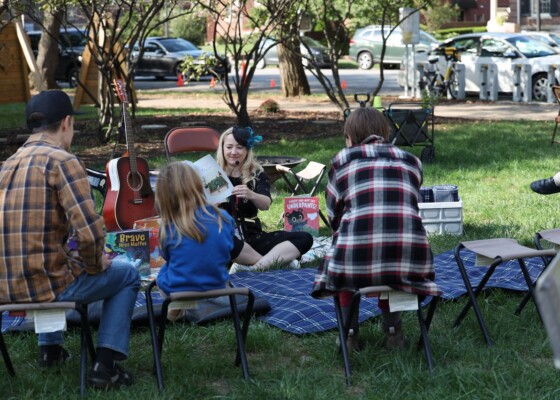Our Commitment
June 4, 2020Injustice and violence against Black people continue to expose the realities of systemic racism. The horrific murder of George Floyd, in the midst of the global pandemic, brings to the…
Injustice and violence against Black people continue to expose the realities of systemic racism. The horrific murder of George Floyd, in the midst of the global pandemic, brings to the surface the pain, profound sadness and exhaustion of a nation in crisis. We grieve for and with the families and loved ones of George Floyd, Ahmaud Arbery, Dreasjon Reed, Breonna Taylor and the many, many others.
Indiana Humanities unequivocally believes that Black Lives Matter.
We offer this pledge to our friends, colleagues and partners who unfairly bear this burden: we hear you, we see you and we are with you. And, we acknowledge that we work within and have benefited from systemic racism.
As the board chair and the president of Indiana Humanities, we believe strongly in the power of the humanities to connect us all. Right now, we’re listening. All of us, board and staff, are seeking experts and voices outside our own organization. We’re heartbroken, trying to find a path forward with the tools we have by building upon successful practices, deepening our relationships with communities of color, and ensuring accessibility and transparency in our grants process.
The deliberate, reflective pace of the humanities doesn’t always feel like it meets the urgency of the moment. But, as with COVID-19, another crisis where the humanities aren’t “first responders,” we have committed ourselves to learning from experts, amplifying and centering credible voices, and focusing on the ways our humanities work can shed light, provide comfort and aid discourse. During this exhausting week, and in anticipation of the long road ahead, here’s why we think the humanities are vital right now:
First, the humanities, especially history, provide context.
Scholars, through meticulous research and lifelong study, expose the complex histories of race, of urbanization, of policing and incarceration, of politics and of protest; they reveal the repeating patterns, the conditions that lead to change and the consequences, intentional or not, of individual and collective decisions. We turn to scholars like Khalil Gibran Muhammad, Ibram X. Kendi and Thomas Sugrue to help us make sense of our contemporary moment.
Second, in literature, we discover writers able to express ideas and emotions that feel impossible to put into words.
Writers bear witness. By turn, writers incense us, comfort us, help us grieve or commit us to justice. Indiana writer Ross Gay, whose poem “A Small, Needful Fact” about Eric Garner’s murder, which has widely circulated during the last week, builds on the work of Etheridge Knight, Mari Evans and Adrian Matejka—all Black Hoosier poets who reflect on race, policing, anger and justice.
Next, the humanities, especially moral philosophy and ethics, help us determine right and wrong.
Before we decide what to do, we must first examine our beliefs and values, as they relate to an issue. Chris Lebron traces the philosophical underpinnings of Black Lives Matter, while Barry Lam helps explicate the ethical dimensions of predictive policing, “uncivil disobedience” or even how the design of public spaces limits or enables freedom.
And finally, the humanities and humanities scholars in particular, help us grapple with uncertainty and tension.
They help us find comfort in intellectual gray areas and be present in liminal moments. So much of our public culture is reductive, combative and zero-sum; in contrast, the humanities force us to wrestle with complexity and resist tidy resolutions.
We believe the humanities are integral to any path forward, which is why Indiana Humanities creates and facilitates programs that encourage Hoosiers to think, read and talk. Our work is guided by our values, which include a culture of learning and listening, inclusiveness, and a commitment to service and partnership. Late last year, we adopted a vision statement for what would happen if we did this work well: An Indiana where the humanities belong to everyone, where action is rooted in insight and where community grows from conversation.
We acknowledge that we do not have answers and pledge to ask better questions. We will provide safe spaces to gather. We will not shy away from uncomfortable conversations and will be accountable. We will generously share our resources. We will show up. We will listen.
We recognize this is a long journey. We are committed to taking the time to get it right. This work involves our board, our staff and our partners, and it is ongoing. In the near term, we are making these commitments:
- We will share readings, toolkits and media that can help Hoosiers think, read and talk about systemic racism, policing and protest.
- We will work with humanists (scholars and writers) to curate texts for reflection on race, justice, protest and community in Indiana. Then we will provide funding and training to help individuals and communities talk about them.
- We will strengthen our efforts to make our grants available and accessible to organizations that use the humanities to spark dialogue, understanding and the stitching together of our social and civic fabric. We are committed to ensuring our grants processes are equitable and transparent.
We have been inspired by our colleague Kevin Lindsey with the Minnesota Humanities Center, who shared this way forward:
“We will continue to strive toward connecting people so that we see and understand how all of our lives are intertwined in mutual destiny. We will continue to work toward being a catalyst for bringing about a more perfect union and positive change in our society. Then we will double our effort.”
—Doran Moreland, Chair, Indiana Humanities board of directors
—Keira Amstutz, President and CEO, Indiana Humanities


